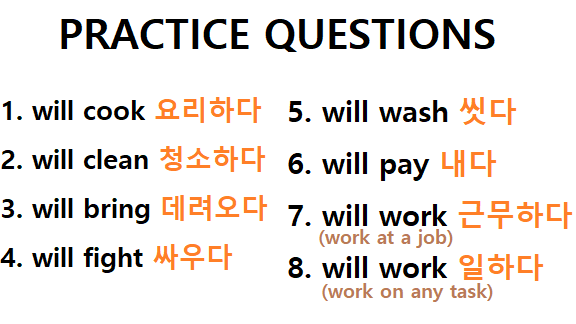ROUGH DRAFT
This is a lesson on time related words. It is an expansion on the previous lesson where we learned time related words like tomorrow, next week, next month, and so on. Let's do it.
Let's start with yesterday. yesterday is "eo-je"
yesterday 어제
Today, today is o-neul
today 오늘
tomorrow is nae-il. We learned nae-il in the last lesson. This word has Chinese origin. il means day and nae comes from the Chinese word for coming. So. the coming day is nae-il.
tomorrow 내일
Now morning has two translation 'o-jeon' which also means a.m. and a new one for us 'a-chim'. a-chim is the one you use when you say good morning. You say 좋은 아침. and a-chim can also mean breakfast.
morning 아침/오전
afternoon, we learned before. It also means p.m. That word is 'o-hu'
afternoon 오후
Tonight can be said two ways. You can say 'this night' i-bam or 'today-night' o-neul-bam
tonight 오늘밤 이밤
OK now I wanna teach you the seasons. spring summer fall winter
spring is bom, summer is yeo-reum, fall is ga-eul, and winter is gyeo-ul
bom, yeo-reum, ga-eul, gyeo-ul.
Have you noticed the Korean name of Big Bang's song "Still Life"? bom, yeo-reum, ga-eul, gyeo-ul. https://www.youtube.com/watch?v=eN5mG_yMDiM
spring 봄 summer 여름 fall 가을 winter 겨울
and in case you need it here is a quick chart of days of the week and months of the year.
This brings us to the main focus of this video. The words for next and last
lets start with next. We already learned next week next month next year. da-eum-ju
da-eum dal and nae nyeon
da-eum means next in Korean and nae in nae-nyeon is like the nae in nae-il. Its derived from Chinese. It means the "coming". nae-nyeon is the coming year.
but there are other ways of saying next in Korean. Here they are. da-eum, dagaoneun or oneun, i-beon, ol-hae, naenyeon
다가오는/오는 and 다음 are used in the same way. you can use them to say next or upcoming you see this 오 in 다가오는/오는 . That comes from the verb to come "o-da". Use that to help you remember that 다가오는 literally means upcoming and 오는 literally means coming
다음 means next. It is most commonly used for next month and next week 다음 달 다음주. but you can also use it for days of the week, days of the year, months of the year, or seasons
also
이번 is another way of saying next. literally it means "this" "time". and you can also use it with days of the week, days of the year, months of the year, or seasons
내년 and 울해 require a bit of thought.
nae-nyeon means next-year so if it is 2022 and I say nae-nyeon I'm talking about 2023. nae-nyeon-shibiwol means next years december. So even though it is september 2022 and the next december will be december 2022 when i say next years december I'm talking about december 2023.
ol-hae means 'this year' so if it is september 2022 and I say ol-hae shibiwol I'm talking about december 2022. The thing about ol-hae is that it doesnt really mean 'next', it means 'this year'. It can refer to the past or the future. if you use it with months/seasons that havent happened yet. it refers to the future. If you use it with month/seasons that have already happened this year it refers to the past. When it is september I can say this year's january ol-hae il-wol to talk about the past. or I can say this years december ol-hae shibiwol to talk about the future.
So that is how we say Next and now Last.
(Jak-nyeon bom means last year's spring. for example if its 2022 and I say jak-nyeon bom I'm talking about spring 2021.)
you can say last spring using either ji-nan or jak-nyeon jeo-beon or the one we just learned ol-hae.
remember again ol-hae means "this year's" so if you want it to mean 'last' you have to use it with months/seasons that have already happened this year. If you use it with months/seasns that havent happenned it means 'next'
Ji-nan just means the most recent. If it is October 2022 and I say last spring like ji-nan bom I'm talking about spring 2022. The MOST RECENT spring.
If I say ji-nan bom in january 2022 I'm talking about spring 2021. the most recent spring.
However if I say jak-nyeon. Notice it has that nyeon in it. nyeon means yeaR. Jak-nyeon means last year. so jak-nyeon bom means last years spring.. for example if its 2022 and I say jak-nyeon bom I'm talking about spring 2021 no mater what day in 2022 it is if I say jak-nyeon bom i mean spring 2021.
jeo-beon is like i-beon. do you remember how "i" means "this" and :jeo" means "that" beon means. time. so jeo beon means that time. As in that time...in the past.







